前言
一直想学习开发一款小程序,无奈拖延至今,恰逢王者荣耀周年庆,然后本人对王者英雄的人物、配音比较感兴趣,就有开发一款王者荣耀故事站的小程序的念头。想要了解故事背景就直接打开小程序就好了。
ps: 因为是业余时间做的,所以 pc 端的爬虫数据展示方面就有点粗糙。
技术栈
小程序 + nuxt + koa2 + vue2.0 + vuex + nginx + pm2
小程序效果图
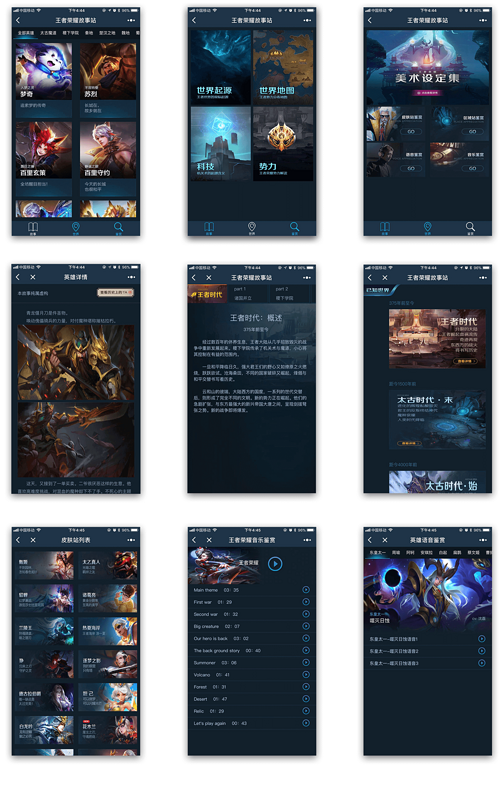
线上体验

pc 爬虫效果图
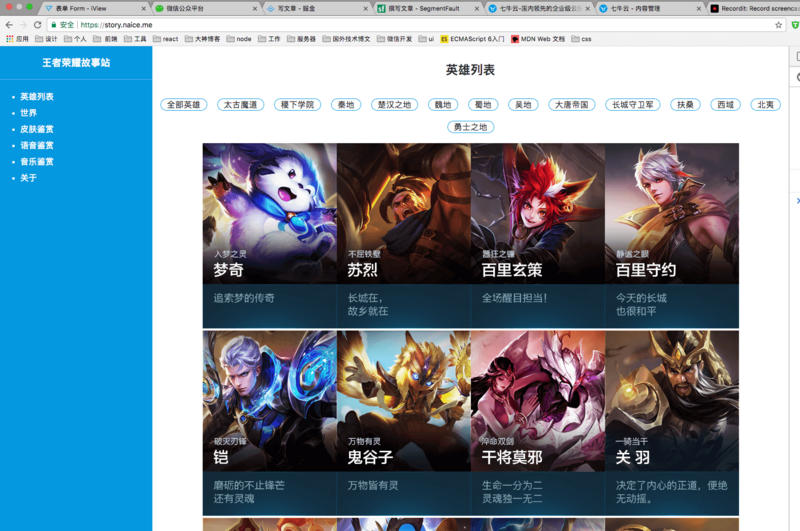
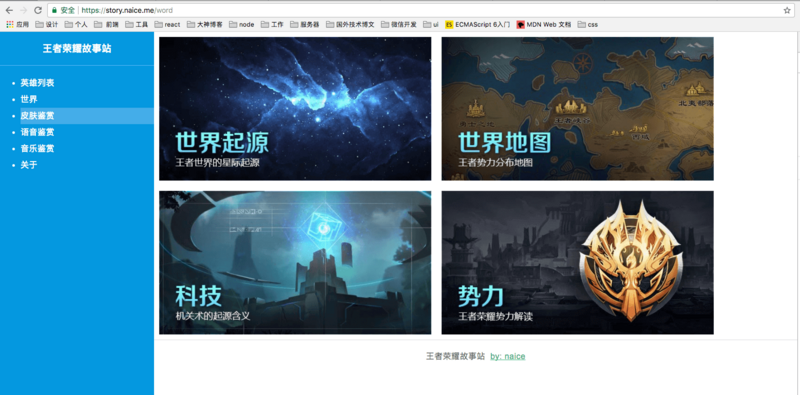
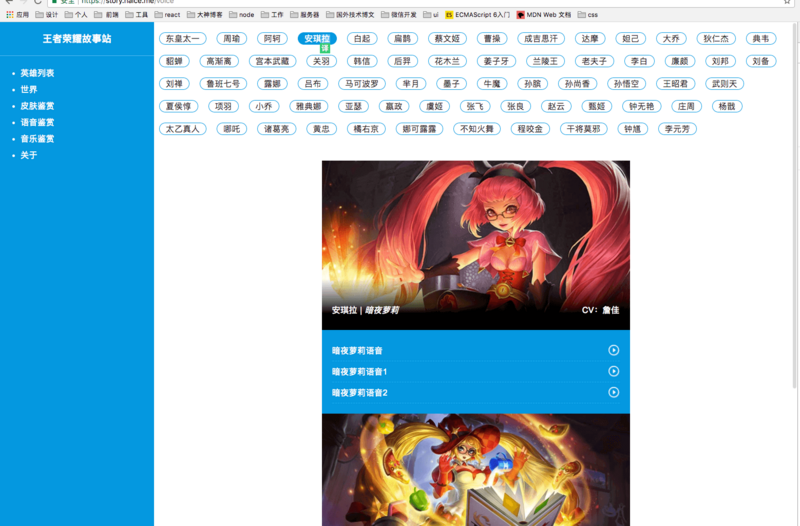
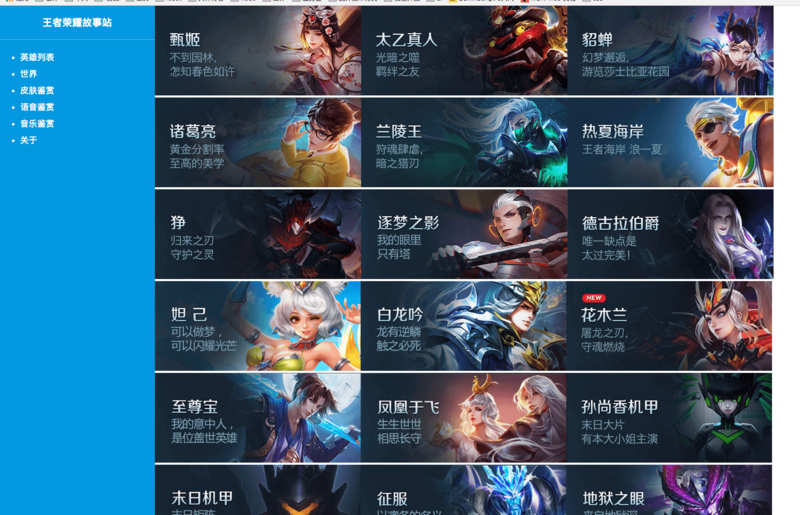
线上地址
https://story.naice.me/
(如果觉得很慢的同学不是你们的网速的问题,是我的服务器配置太渣了2333)
首先说下爬虫数据
数据爬虫都是从王者荣耀故事站官网来爬取的,然后直接用 next/koa 作为后台,用cheerio模块和request-promise模块基本就可以爬到我们想要的数据了,有时候爬取出来的数据回事乱码(非 utf-8的)我们就借助iconv模块去转成我们想要的中文字符。这些模块说明文档在相应的 gihub中都说的很详细。就不一一介绍。
下面举例一下爬虫英雄列表首页的过程,都注释在代码里面
// 引入相应的模块
import rp from 'request-promise'
import cheerio from 'cheerio'
import { writeFileSync } from 'fs'
const Iconv = require('iconv').Iconv
const iconv = new Iconv('GBK', 'UTF-8')
// request 国外网站的时候使用本地的 VPN
// import Agent from 'socks5-http-client/lib/Agent'
// 爬取英雄列表
const getHeroStory = async() => {
// request-promise的配置
const options = {
uri: 'https://pvp.qq.com/act/a20160510story/herostory.htm',
// agentClass: Agent,
// agentOptions: {
// socksHost: 'localhost',
// socksPort: 1080 // 本地 VPN 的端口,这里用的 shadowsocks
// },
transform: body => cheerio.load(body) // 转成相应的爬虫
}
// 爬取导航复制给cheerio的$对象
const $ = await rp(options)
let navArr = []
let heroList = []
$('#campNav li').each(function () {
// 分析节点拿到数据
const type = $(this).attr('data-camptype')
const text = $(this).find('a').text()
// push 到navArr数组中
navArr.push({ type, text })
})
// 爬取英雄列表
const hreodata = await rp({
uri: 'https://pvp.qq.com/webplat/info/news_version3/15592/18024/23901/24397/24398/m17330/list_1.shtml'
})
// 数据处理
let str = hreodata.replace('createHeroList(', '')
str = str.substr(0, str.length - 1)
let r = JSON.parse(str)
heroList = r.data.filter(item => item)
let result = {
nav: navArr,
heroList
}
// 写入文件
writeFileSync('./server/crawerdb/heroList.json', JSON.stringify(result, null, 2), 'utf-8')
return result
}
// 跟去英雄 id,和 url 爬取英雄的详细介绍
const getHeroDatail = async(url, _id) => {
// 配置
const option = {
encoding: null,
url
}
// 爬取英雄详情
const $ = await rp(option).then(body => {
// 字符乱码处理
var result = iconv.convert(new Buffer(body, 'binary')).toString()
return cheerio.load(result)
})
// 这里拿到$之后就像 jq那样子,根据文档就可以进行爬虫的数据处理了
// 下面都是数据处理
let heroName = ''
let heroDetail = []
let ht = ''
let hc = ''
if ($('#heroStory').length) {
heroName = $('.hero_name pf').text()
$('#heroStory p').each(function () {
let text = $(this).text().trim()
heroDetail.push({
type: 'text',
text: text
})
})
} else if ($('.textboxs').length) {
$('.textboxs p').each(function () {
if ($(this).find('img').length) {
let src = $(this).find('img').attr('src')
heroDetail.push({
type: 'img',
text: 'https:' + src
})
} else {
let text = $(this).text().trim()
heroDetail.push({
type: 'text',
text: text
})
}
})
}
let hStr = ($('#history_content').text()).replace(/(^\s+)|(\s+$)/g, '');
if (hStr.length > 0) {
ht = $('.history_story h3').text()
hc = $('#history_content').text()
}
let result = {
heroName,
heroDetail,
historyTitle: ht,
historyContent: hc
}
// 写入文件
writeFileSync('./server/crawerdb/herodetail' + _id + '.json', JSON.stringify(result, null, 2), 'utf-8')
return result
}
export default {
getHeroStory,
getHeroDatail
}
然后在 koa里面配置好路由就可以一步步爬取数据了
nuxt
Nuxt.js 是一个基于 Vue.js 的通用应用框架。通过对客户端/服务端基础架构的抽象组织,Nuxt.js 主要关注的是应用的 UI渲染。我们的目标是创建一个灵活的应用框架,你可以基于它初始化新项目的基础结构代码,或者在已有 Node.js 项目中使用 Nuxt.js。Nuxt.js 预设了利用Vue.js开发服务端渲染的应用所需要的各种配置。
根据文档 page 下面的结构就是对应的 vue 的路由结构,然后配置好nuxt.config.js你所需要模块、插件、webpack 配置等等都有很好的中文文档说明。会 vue的同学,去看一下官网就可以大概有个很好的了解了。
下面是整个项目的目录结构
.nuxt/
build/ ---打包发布
components/ ---组件
layout/ ---布局
pages/ ---对应的路由
--| about.vue/
--| music.vue/
--| word.vue/
--| skin/
--| index.vue
--| ....
server/ --对应的koa 后台
static/ ---静态资源
store/ --vuex
小程序
这是我第一个小程序。所以一开始看文档,写起数据绑定的时候,会有种跟 vue 的异曲同工的感觉.
下面是官荒的小例子
demo.wxml
<view> Hello {{name}}! </view>
<view wx:for="{{array}}">
{{index}}: {{item.message}}
</view>
demo.js
Page({
data: {
name: '小程序',
array: [{
message: 'foo',
}, {
message: 'bar'
}]
}
})
是不是太熟悉了????当然里面实现的技术还是想差别很大的,想去详细的了解,我觉得《一起脱去小程序的外套 - 微信小程序架构解析》这篇文章,很是不错,我初学的时候,是先体验一番小程序的demo,然后直接动手(光看不动瞎扯淡),再去深入了解原理、pages 的生命周期,逻辑处理、框架、组件、api 等等,理解了这些之后,后面就很容易啦!!
附一张小程序的运行生命周期图(来源于遇见大神的文章),用来理解小程序的整个运行过程
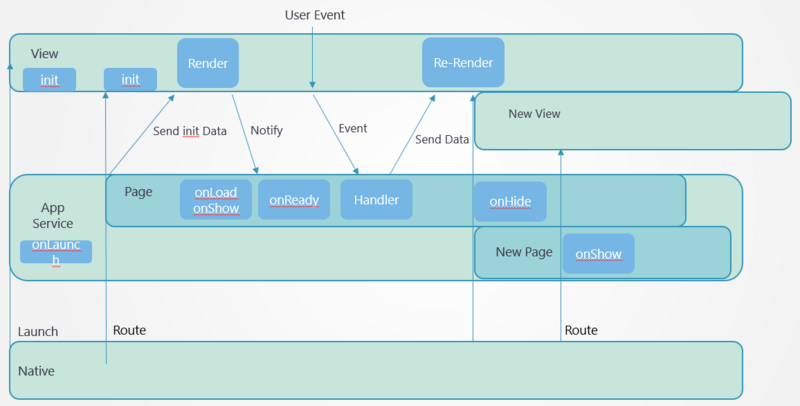
github
小程序:https://github.com/naihe138/h...
小程序后台爬虫: https://github.com/naihe138/h...
博客文章:https://blog.naice.me/
如果大家觉得有用的话,求一个闪晶晶的 start ,谢谢各位大佬



